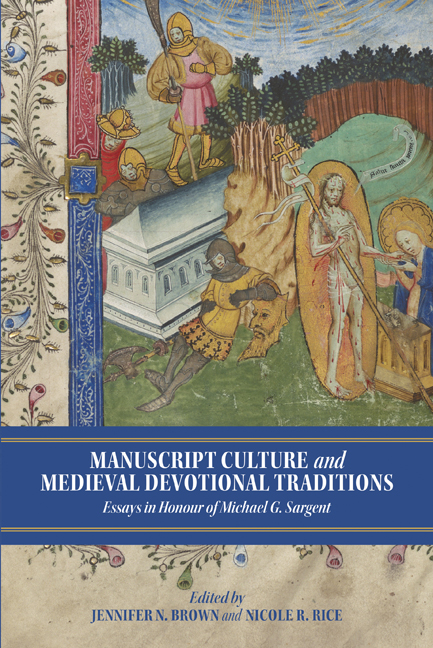Book contents
- Frontmatter
- Dedication
- Contntes
- List of Illustrations
- Acknowledgements
- List of Abbreviations
- Michael Sargent: An Appreciation
- I Manuscript Transmission and Textual Adaptation
- II Translated Texts and Devotional Implications
- III Rhetorical Strategies and Spiritual Transformations
- IV Texts and Contours of Religious Life
- Bibliography
- List of Contributors
- Michael G. Sargent’s Publications
- Index
- Tabula Gratulatoria
- York Manuscript and Early Print Studies
5 - Rendering Readers’ Soulscapes: Variant Translation of Interiority in the Late Medieval English Pseudo-Bonaventuran Tradition
Published online by Cambridge University Press: 24 March 2021
- Frontmatter
- Dedication
- Contntes
- List of Illustrations
- Acknowledgements
- List of Abbreviations
- Michael Sargent: An Appreciation
- I Manuscript Transmission and Textual Adaptation
- II Translated Texts and Devotional Implications
- III Rhetorical Strategies and Spiritual Transformations
- IV Texts and Contours of Religious Life
- Bibliography
- List of Contributors
- Michael G. Sargent’s Publications
- Index
- Tabula Gratulatoria
- York Manuscript and Early Print Studies
Summary
As Sarah McNamer reminds us, meditative devotional works are not primarily ‘aesthetic artefacts. They had serious, practical work to do: to teach their readers, through iterative affective performance, how to feel.’ In such texts, shareable narrative experience, through reading or hearing, becomes an intensely personal refraction of such experience recreated in inward verisimilitude; for, as Jennifer Bryan points out: ‘“Inward” here is more concrete and lifelike … Inward beholding creates personal and intimate knowledge, knowledge that pertains to the reader's soul alone.’ These are both valid comments from scholars who understand well how such texts work in the imaginations – in the souls – of late medieval readers. The approaches of such scholars, which are truly valuable, tend more often than not to have the reader and the reading experience rather than the processes of literary translation in mind. There is nothing wrong with this. This essay, however, pays attention to a special kind of reader – the reader of the Latin tradition who performs his reading in textual form by translating it. These text-making readers teach reading and feeling in their own different ways, which become all the more interesting and revealing when we encounter them treating the same material.
And, outside the Bible, what material in late medieval English religious literary mainstream culture is more important than the meditative tradition of the Meditationes vitae Christi? This study accordingly addresses the issue of how, in this vitally important area of late medieval English devotional literary culture, each choice of translation – down to the smallest preposition, change of wording or shift of voice – affects the configuration of narrative experience and reader interiorities, especially in devotional works setting out to engage the imaginations of their readers and to teach them not only how and what to imagine but also how to dispose themselves with regard to variable topographies of interiority. Whatever a translator's motivations, the tiniest details of such treatment entail experiential and ideological variation significant to the ongoing formation of the piety and habitus of readers and hearers. Translations of the same source present particularly useful opportunities for scrutinizing productive variancy in linguistic quantities and in features that may sometimes seem small but which may also have considerable semantic, ideological, theological and affective reach and import.
- Type
- Chapter
- Information
- Manuscript Culture and Medieval Devotional TraditionsEssays in Honour of Michael G. Sargent, pp. 109 - 131Publisher: Boydell & BrewerPrint publication year: 2021

